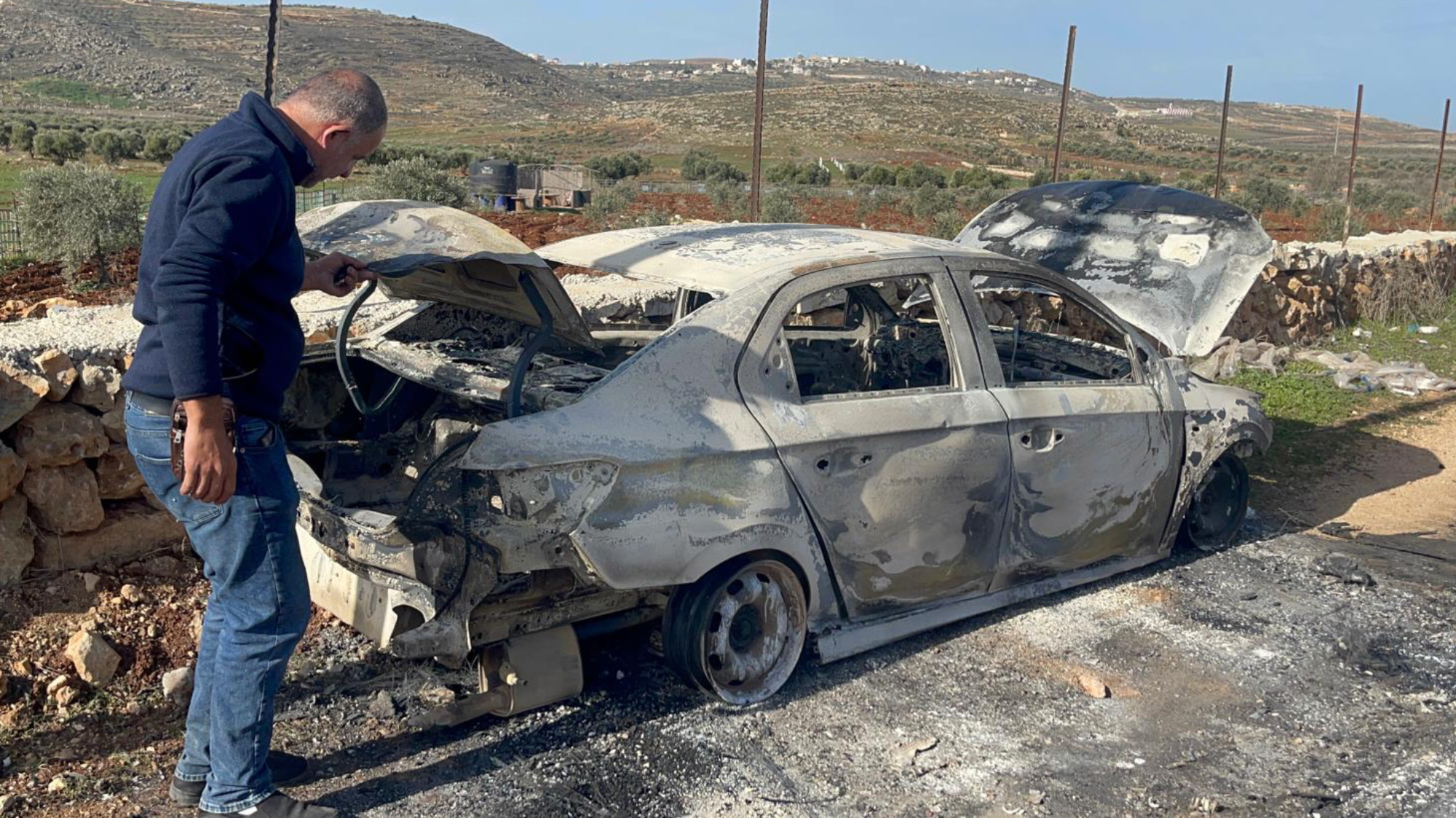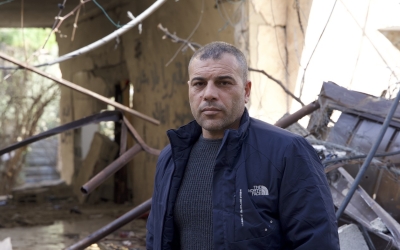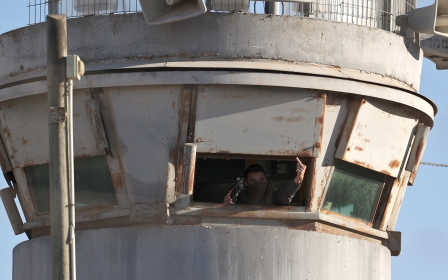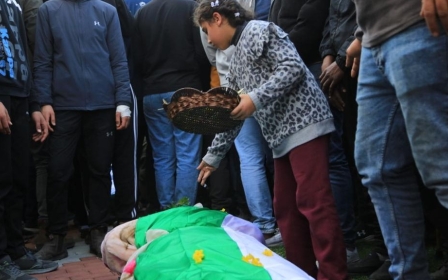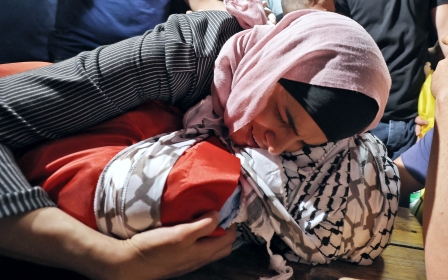Palestine: Vengeful Israeli settlers on rampage following Jerusalem attack
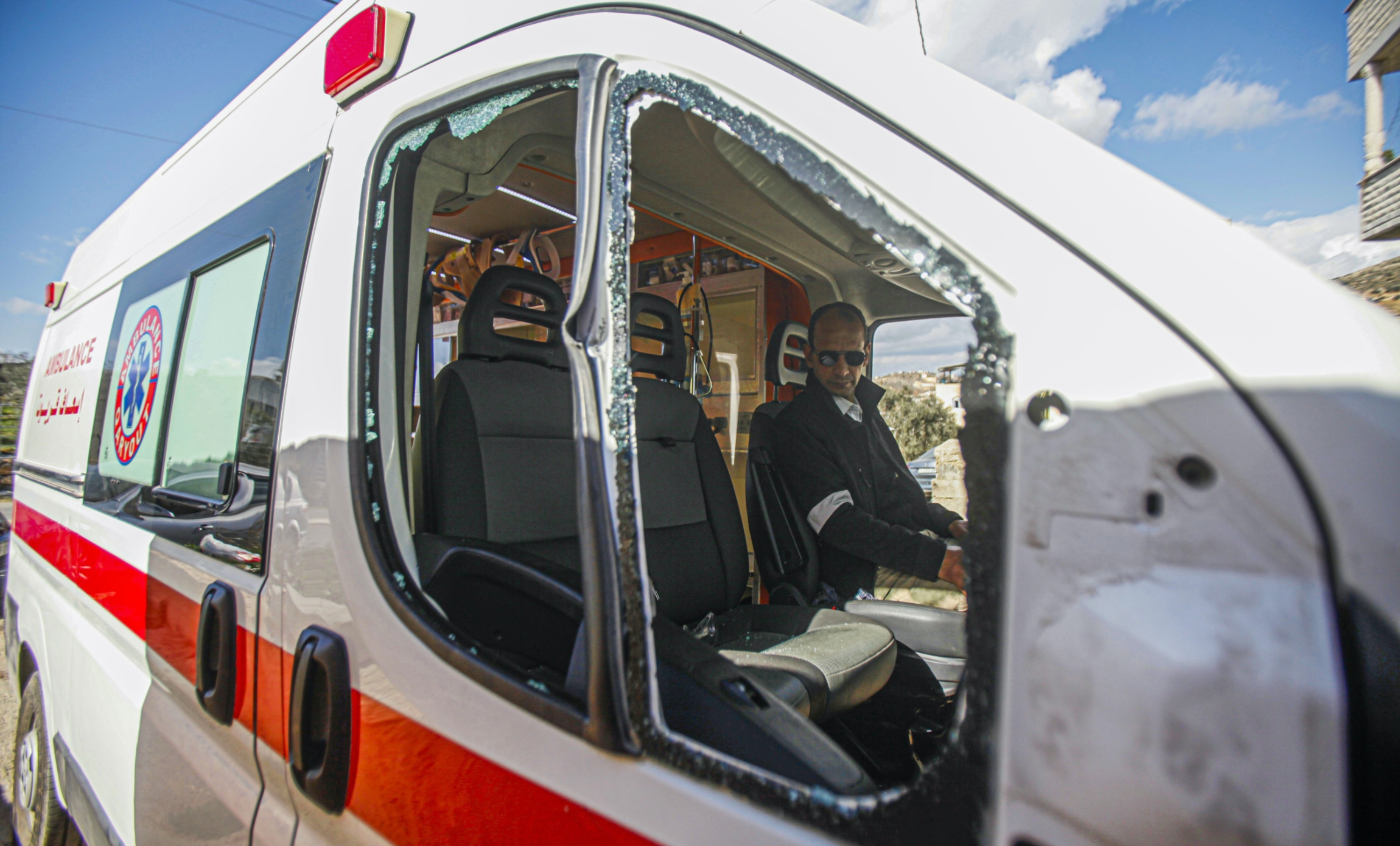
Shortly after 9:30pm on Saturday, long past nightfall in the Palestinian village of Jalud, Mohammad Abad was settling down for the night with his family when he heard a commotion outside.
Under cover of the night, Israeli settlers slipped between the houses of Jalud and began attacking Palestinian homes and property. Locals say settlers used pepper spray during the attack, set vehicles on fire, threw rocks, while other shot bullets into the air.
Mohammad Abad, a 40-year-old construction worker, said most of the village's people were sitting at home when the attacks began. Once the residents realised what was happening, Palestinian youths confronted the settlers with rocks.
"The only thing we can do to defend ourselves is throwing rocks back at them. For years we have been asking for safety and security and a way to protect ourselves," said Abad.
He told Middle East Eye that Israeli soldiers showed up about an hour later and began firing tear gas at the Palestinian residents for over half an hour.
"Even when the soldiers came, the settlers continued to attack us. The soldiers threw so much tear gas at us that it filled the houses - the kids inside were struggling to breathe."
Abad said one resident needed to be hospitalised and undergo surgery after his leg was fractured during the attacks. He added that the villager was lucky to have reached the hospital following an attack by settlers on an ambulance in nearby village Qaryut, southeast of Nablus.
'Every hour, every minute, everywhere'
The town of Jalud has been subject to constant attacks by settlers over the years. The Israeli settlers and army have taken over six of the seven hilltops around the village. Seizing the final hilltop will give them complete control over the area.
"Settler attacks on Jalud happen day and night. Settler violence began in 1997 when they started stealing our land and the land of the villages around us to build the settlements," said Raed Hajj Mohammed, the head of Jalud's village council.
'The soldiers threw so much tear gas at us that it filled the houses - the kids inside were struggling to breathe'
- Mohammed Abad, Jalud resident
Not long after Saturday's attack on Jalud began, another settler attack broke out in Huwwara, a Palestinian town south of Nablus. Settlers attacked Palestinians on the town's main road, which both Palestinians and Israeli settlers use.
Huwwara's mayor, Moeen Dmeidi, told MEE that Palestinians in the area are exposed to almost daily attacks from settlers under the protection of the Israeli army on this route.
Around 10pm that night, Israeli forces prevented all Palestinian cars from passing through the central road of Huwwara, Mahdi Ibrahim, 33, a local shop owner, told MEE.
Around 20 settlers got out of their cars and "started vandalising our shops with rocks, bats and metal pipes. They could have killed us," said Ibrahim.
"They attacked my shop with rocks; it's going to cost me around 2,000 shekels to fix everything," he added, standing among the wreckage the settlers had left behind.
Most of the settlers who attacked Huwwara and neighbouring towns were from the Yitzhar settlement, a 10-minute drive away from the village.
Meanwhile, locals have reported ambulances being obstructed from passing through the road connecting the north and south of the West Bank.
"Over the past two days, we have experienced attacks from more than 70 settlers - every hour, every minute, everywhere. When the settlers come to attack us, we try to defend ourselves with anything we can find, even if it's rocks or sticks," Ibrahim told MEE.
Referring to an attack by a Palestinian gunman who killed seven Israelis in occupied East Jerusalem last week, Mayor Dmeidi said, "If there are any 'security risks' to the Israeli state, the people of Huwarra are on the front line of the settler attacks."
The attack came a day after Israeli forces killed nine Palestinians during a raid on the Jenin refugee camp.
'Apartheid system'
The weekend following the shooting in East Jerusalem, Palestinians across the West Bank have experienced a spike in settler attacks. On Sunday, Israeli settlers carried out 144 attacks against Palestinians and their property in Nablus alone.
Attacks have also occurred in the Jordan Valley, Turmus Ayya in northern Ramallah, and Tuwani village in Masafer Yatta.
In Masafer Yatta, which borders the Green Line, several Palestinian communities have seen an increase in settler violence.
Sami Hureini, a resident and activist in Tuwani village, told MEE that although settler attacks have risen in recent months, the violence in the past few days has been "tough".
"[On Sunday], my cousin and I found a group of settlers destroying a stone wall we are building. When they saw us, they started running towards us, and we had to retreat. Otherwise, they were going to kill us," he said.
"Since the beginning of January, around 100 trees have been damaged, and hundreds of attacks have taken place. This apartheid system is a big issue. It affects us daily."
Sami said Israeli police never follow up on reports Palestinians file following settler attacks.
"Settlers are never held accountable because they work with the army to evict us from our land."
Although local Palestinians believe the spike in settler violence is linked to the Palestinian attack in East Jerusalem, they say settler violence has always been a part of their lives.
"Settler violence is not only tied to such incidents. Their attacks are ongoing. They are terrorists and criminals. The government not only protects them, but the new government encourages them," Hajj Mohammed, the mayor of Jalud, said.
As Israel's extreme right-wing government prepares to "strengthen" settlements in the West Bank and expedite policies to make guns more accessible for its citizens, Palestinians expect the situation to worsen.
Hajj Mohammed believes that Itamar Ben Gvir, Israel's national security minister, "is a criminal".
"He supports the Haganah crimes committed during the Nakba and wants those same crimes to continue. He intends to continue enforcing policies to expel Palestinians from their land so they can have complete control."
This article is available in French on Middle East Eye French edition.
Middle East Eye propose une couverture et une analyse indépendantes et incomparables du Moyen-Orient, de l’Afrique du Nord et d’autres régions du monde. Pour en savoir plus sur la reprise de ce contenu et les frais qui s’appliquent, veuillez remplir ce formulaire [en anglais]. Pour en savoir plus sur MEE, cliquez ici [en anglais].


